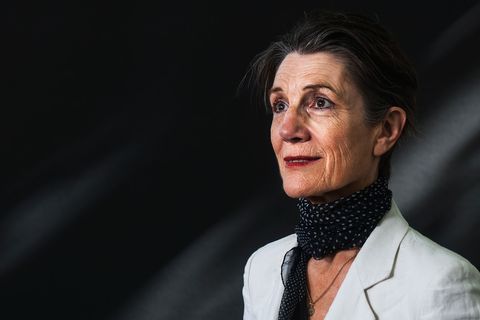‘After Yang’ review: Colin Farrell sci-fi drama on Showtime

About midway by “After Yang,” an exquisite dispatch from a hazily described foreseeable future, Jake (Colin Farrell), a tea-store proprietor, initiates his son, Yang (Justin H. Min), into some of the mysteries of his trade. What sets a single form of tea aside from a different? The flavor, surely, but also the fullness of what that style conveys: the leaves that had been harvested and processed the soil from which the vegetation sprang the rain that watered the soil the individuals who cultivated the soil and their full society, historical past and way of life. Crediting these insights to a 2007 documentary, “All in This Tea” (and executing a damn fantastic Werner Herzog impression), Jake inevitably stops chatting and requires a sip. Tea, effortless to love, is instead more durable to set into phrases.
The exact is true of some movies, and “After Yang,” the next aspect from the Korean American writer-director Kogonada (“Columbus”), is very substantially its individual delicate, bittersweet and curiously intoxicating brew. The working experience of looking at it provides quickly identifiable flavors and associations: It is a gentle-toned relatives drama and a moody futuristic fable, with a faint techno-paranoid aroma, a melancholy mouthfeel and a lingering aftertaste of existential unease. Viewers who admire some of the filmmakers Kogonada admires (he’s produced quite a few wonderful video essays about them) will detect trace influences listed here and there, nevertheless I suspect they will also be amazed by how deftly he synthesizes these influences into one thing that transcends imitation.
To wit: At various points Jake keeps in contact with his spouse, Kyra (Jodie Turner-Smith), employing a technique of gadget-significantly less remote interaction that Kogonada represents by owning the actors speak directly into his camera — a approach that readily (but sparingly) evokes the perform of the late Japanese learn Yasujiro Ozu. But the affinity is additional than a make any difference of exact cuts and static pictures. (“After Yang” was shot in generally rigid widescreen compositions by Benjamin Loeb Kogonada served as his individual editor.) There is one thing of Ozu’s restraint in the way this film dramatizes a unfortunate second of modify, a transformation that impacts a family members not as a result of noisy eruptions of melodrama but through tiny, nearly imperceptible ripples of psychological disturbance.
If this had been Ozu, even though, it would have to be titled “I Was Born Bot.” Yang is a “technosapien,” a advanced flesh-and-steel android whom Jake and Kyra purchased as a large brother and instructor for their daughter, Mika (Malea Emma Tjandrawidjaja), when they adopted her as a toddler from China. Now Mika is in elementary college, and Yang, who teaches her Chinese and is a wellspring of information about her birth country’s historical past and culture, has almost come to be a member of the relatives. I say “practically” simply because when Yang quickly breaks down — a malfunction that feels synonymous with demise, even if it simply cannot technically be explained as these types of — Jake, Kyra and Mika are thrown into a point out of anguish but also confusion, remaining to fumble their way via levels of grief with several distinct precedents or definitions.
Justin H. Min and Haley Lu Richardson in the motion picture “After Yang.”
(Linda Kallerus/A24)
Kyra, neat, pragmatic and somewhat frustrated by Jake’s around-reliance on Yang as a babysitter, believes they ought to accept their reduction and transfer on. Jake and Mika maintain out hope that Yang can be repaired, even right after he’s deemed unsalvageable by a shady technician (Ritchie Coster) and a large-minded museum researcher (Sarita Choudhury), both of those of whom want to use Yang’s parts for their personal functions. These times assistance fill in our comprehension of this unspecified upcoming, where artificial intelligence and human cloning are constant but not fully comprehended realities. We master a little bit more from a welcoming neighbor (Clifton Collins Jr.) whom Jake looks down on for possessing clone young children, a own prejudice versus which the movie will carefully thrust back.
For the most portion, though, our vantage is sharply restricted if there are any dystopian hazards, they are typically concealed from look at. In hanging contrast with “Columbus,” Kogonada’s 2017 ode to the glories of Midwestern modernism, “After Yang” has number of exterior creating shots. The self-driving motor vehicles that carry Jake, Mika and Yang to their appointments are glimpsed only from the within. Most of the story unfolds at home, a softly lit warren of leafy houseplants, balsa-tone furnishings and minimalist East Asian influences it is beautiful sufficient for a magazine unfold, but there is a nicely rumpled good quality to its wind-chimey class. It’s a house you may well assume for a family members whose very own unconventional make-up — white father, Black mom, two Chinese young ones — suggests a microcosm of the new globalist buy.
Regardless of whether Yang can even be called Chinese is just one of the movie’s extra intriguing strains of inquiry, and Min’s overall performance invests it with a playful philosophical pounds. Some of the tenderest times transpire concerning Yang and Mika, whose close bond implies that a shared species can be considerably less unifying than a prevalent culture. The movie is delicate to Mika’s emotions of loneliness and alienation, even as its visible layout embodies a harmonious harmony concerning East and West. But it is no a lot less attuned to Yang’s concealed humanity, the odd alchemy that can, with time and consideration, lend a robot’s inner circuitry the contours of a soul.
Malea Emma Tjandrawidjaja and Justin H. Min in the film “After Yang.”
(Linda Kallerus/A24)
A person word for that alchemy is “memory.” Some of the movie’s most influencing times — ushered alongside by the tunes of Aska Matsumiya and Ryuichi Sakamoto — locate Jake sifting as a result of Yang’s memory financial institution, a trove of quick online video clips that supply a window into what may possibly be unbiased feelings. What does a robot take into consideration unforgettable? A towering tree? A dancing kid? A new pal (played by “Columbus’” Haley Lu Richardson)? In these moments, “After Yang” could be paying homage to the similarly titled “After Everyday living,” Hirokazu Kore-eda’s 1999 movie about the quest to find and preserve a single, ideal memory. And it’s not just a common identify that reminded me of the late Taiwanese auteur Edward Yang, whose great spouse and children drama “Yi Yi” — yet another tale about marital pressure, gradual loss, a father’s journey, a child’s reckoning — finds aware and unconscious echoes right here.
All these whispery abstractions and cinephile allusions can really feel like too a lot, or most likely as well minimal. But as he shown in “Columbus,” Kogonada has a present for merging the meditative distance frequently involved with artwork cinema and the beats of an absorbing, character-driven narrative. Just about every individual in this film can seem terribly isolated at periods, but Kogonada opens up distances in buy to bridge them. In time his visual fashion relaxes as Jake and Kyra start off separately reconstructing their individual recollections of Yang, replaying them with diverse text and from diverse angles. The camera abandons its rigid stance and moves in near, as if to suggest that the really act of remembering, and of loving the a single you try to remember, can be a carefully environment-shaking act.
An additional way of putting it is that “After Yang,” for all its restraint, is alive to the special electricity of actors. And Kogonada has a wonderful a single in Farrell, whose gaze, mournful and curious by turns, carries the excess weight of this movie’s speculative inquiry. It is both coincidental and instructive that when Farrell can be seen performing up a storm in a different film opening this week — a thing about a bat and a guy — it’s his quietly assured do the job here that hints at the complete scope of what he can do. In “The Lobster” and “The Killing of a Sacred Deer,” the director Yorgos Lanthimos aptly recognized that Farrell’s physical splendor could be an obstacle, that a dad bod and a tragicomic makeover could unearth his deeper dimensions as an actor. He’s attractive once more in “After Yang,” but people dimensions continue to be, and potentially resonate all the far more, in a tale that teases out humanity exactly where you may possibly not consider to search.
‘After Yang’
Rating: PG, for some thematic features and language
Operating time: 1 hour, 35 minutes
Actively playing: Starts off March 4 at Alamo Drafthouse Cinema Downtown Los Angeles and the Landmark, West Los Angeles also streaming by means of Showtime




![30 Greatest Journey Films on Netflix [Updated 2022] 30 Greatest Journey Films on Netflix [Updated 2022]](https://www.streamingrant.com/wp-content/uploads/2022/08/uncharted-1.jpg)

